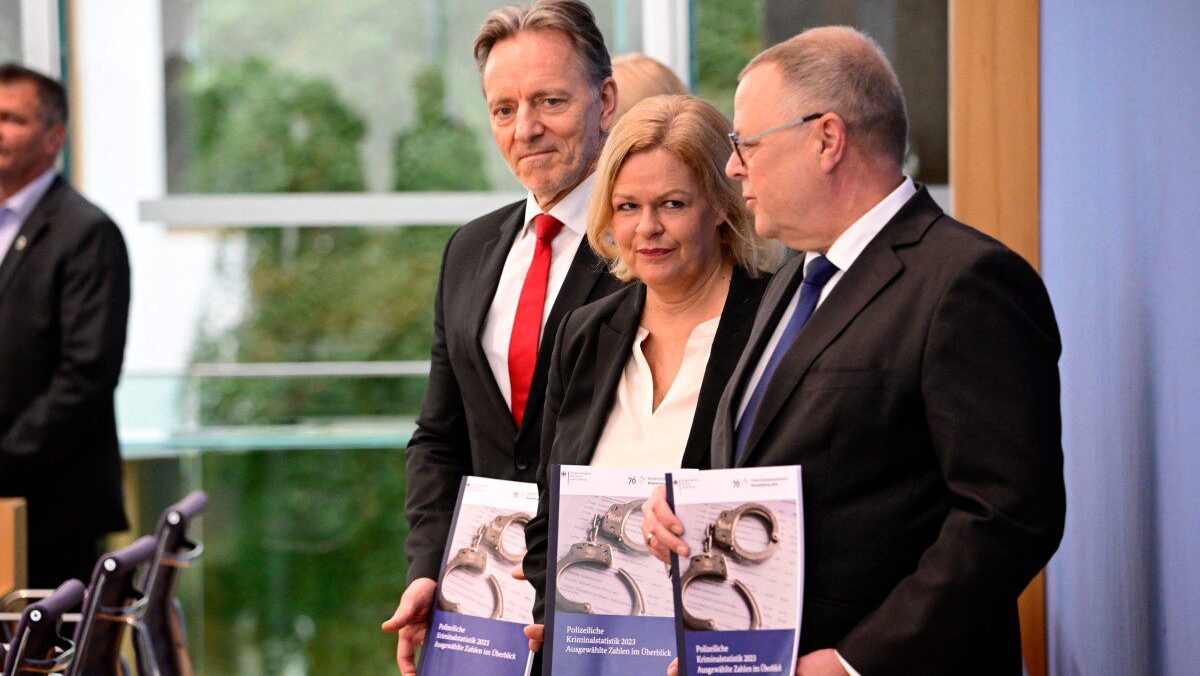
German Interior Minister Nancy Faeser (C) is flanked by the president of the Federal Criminal Police Office Holger Muench (L) and Brandenburg’s Interior Minister Michael Stuebgen (R) as they present Germany’s 2023 criminal statistics, on April 9, 2024 in Berlin.
Photo: Tobias SCHWARZ / AFP
Under Interior Minister Nancy Faeser, who during her tenure has encouraged mass illegal migration, undermined the meaning of citizenship, and persecuted civil servants opposing her agenda, Germany in 2023 saw violent crime soar to historic highs and the proportion of foreign criminal suspects rise sharply.
Germany’s Federal Criminal Police Office’s (BKA) annual crime statistics report, presented by Interior Minister Faeser (SPD) on Tuesday, provoked strong reactions across the country after it revealed that violent crime climbed to its highest level since 2009 and the number of foreign suspects of violent crimes increased by 14.4% compared to 2022, Junge Freiheit reported.
As has been witnessed in years past, foreigners, meaning any non-German citizen, accounted for a vastly disproportionate percentage of all criminal suspects, at 41.1%, up from 37.4% in 2022, and 33.8% the year before. On the other hand, the overwhelming majority of victims, 75%, were German citizens.
In response to the alarming figures, opposition parties issued sharp criticism of the left-liberal traffic light coalition’s pro-mass migration policies and called for a drastic shift in policy.
Alternative für Deutschland (AfD) deputy domestic policy spokesman Martin Hess demanded a “radical turnaround” in migration. He added the figures reveal “a completely unacceptable failure of the traffic light coalition,” and said that “Federal Interior Minister Faeser has obviously lost control of internal security.”
Hess’s CDU/CSU counterpart, Alexander Throm, spoke similarly when he told Deutschlandfunk,
It has long been known that the proportion of crime is higher among non-Germans, and this has now increased significantly again. We need a correction to the current open traffic light migration policy.
The course correction on immigration, Throm said, should include limited immigration, increased controls, fewer social benefits for asylum seekers, restriction of residence rights, and more resources for the Federal Criminal Police Office.
The CDU has attempted a precarious balancing act in distancing itself from the ‘extreme right’ while replicating many of the anti-globalist AfD’s strict stances on immigration. CDU party leader Friederich Merz was criticized earlier this year for legitimizing the ‘far-right’s’ discourse by presenting a tougher immigration policy than his party embraced under former Chancellor Angela Merkel.
“Germany has been a country of immigrants for decades,” Merz told Reuters after the party congress in January, “one that very successfully integrated immigrants.” He did, however, admit that the country faces a challenge with poorly integrated immigrant groups, “often but not always of Islamic faith.”
Criticism, genuine or not, also came from within the traffic light coalition. “Anyone who thinks that migration does not pose any problems for local society is actually making life in the Federal Republic more dangerous,” FDP deputy leader Wolfgang Kubicki told Tagesspiegel.
Violent criminal incidents—those resulting in serious injuries, robberies, and various sexual crimes—shot up 8.6% year over year, with authorities registering 214,000 total cases in 2023. The number of cases involving dangerous and grievous bodily harm ballooned to more than 154,000, 6.8% more than last year, and a record high. Foreigners, despite making up only some 15% of the population, comprised 41.2% of suspects implicated in violent crimes involving dangerous and grievous bodily harm.
Instances of rapes and other sexual crimes rose by 2.4%, with foreigners comprising around a third of all suspects, amounting to a proportional year-over-year increase of 4.2%.
Meanwhile, robbery offenses increased by 17%, with the primary contributing factor behind the increase being a 22.4% uptick in foreign suspects. Nearly half of the robbery suspects did not have a German passport.
When it comes to all crimes, the quantity and proportion of foreign suspects both spiked sharply. Like violent crimes, the number of non-German suspects also rose sharply to 923,000, a 17.8% increase compared to 2022.
A sharp upward trend is also observable in non-violent cases of theft. Home burglaries jumped 18.9%; car theft 17.5%; shoplifting 23.6%; and pickpocketing 11%. Of the 424,000 theft suspects identified, 187,000, or 44%, were non-German passport holders, representing a 22.8% increase compared to the prior year.
For the responsible federal interior minister’s part, she responded to the damning data by saying: “Anyone who doesn’t follow the rules has to leave.”
“We are seeing an increase in violent crime, more youth crime, and more foreign crime,” Faeser acknowledged:
The rule here is zero tolerance. In concrete terms, this means quick proceedings and noticeable penalties. Foreign perpetrators have to leave Germany much more quickly. The strict deportation rules we have created must now be enforced.
Further left on the political spectrum, the Greens blamed any connection between immigration and crime on the fact that foreigners often fall into “socio-economically weak groups”—who supposedly are more likely to be criminals; a dubious but frequently presented argument from the left.
“From my perspective, this is a mandate for politics, especially to investigate the root causes,” Green MP Lamya Kaddor said on X, also blaming an increase in youth criminality on the isolation young people experienced under COVID and a resulting “right-wing extremism”
Isolation and loneliness can make children and young people in such a challenging situation more susceptible to extremist attitudes, which are associated with a higher propensity for violence.
